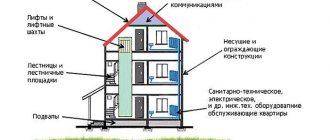Often, property owners ask the management organization to provide a “house balance sheet” for review. Such a document does not exist, but this argument will not satisfy the tenant and problems may begin.
Let’s figure out what owners mean when they ask for a “house balance” and what information can be provided in response to such a request.
How to work with owners’ requests to GIS Housing and Communal Services
Owner's personal account and MKD personal account
There is no concept of “home balance” in current legislation. But if you receive a request to provide such data, do not rush to refuse the owner, so as not to provoke a conflict.
The owner’s request to provide a “house balance” may mean that he wants to receive a statement with the details of his personal account or the personal account of the house. We advise you to clarify what exactly the owner wants to receive after receiving the application, because the management organization is obliged to provide some information, but problems may arise with others.
Let's deal with the legislation. Clause 3.18 of GOST R 51929-2014 provides the concept of an MKD personal account. This is an accounting register that is designed to record transactions related to accruals, borrowings, receipts and expenditures of funds in accordance with contractual obligations for the operation, management and maintenance of apartment buildings.
Art. 10 of Federal Law No. 402-FZ dated December 6, 2011 defines the term accounting register. An accounting register is a document in which data contained in primary accounting documents is recorded and accumulated. Based on its data, the organization’s financial statements are compiled (Part 1, Article 13 of the Federal Law of December 6, 2011 No. 402-FZ).
A home’s personal account is an accounting register that collects information about the receipt and expenditure of funds for each apartment building. Current legislation does not oblige management organizations to maintain accounting records for each house under management. It is possible to prepare financial statements for an organization without such information.
At the same time, Order No. 94n of the Ministry of Finance of the Russian Federation dated October 31, 2000 obliges to maintain analytical records of settlements with consumers in the context of not only each consumer, but also each issued invoice.
Therefore, to maintain analytical accounting, management organizations use special programs or turn to settlement centers. For their own convenience, they group information about consumers by belonging to one MKD.
A personal account is opened for each consumer, which stores information about:
- accrued amounts;
- received payments;
- debt and overpayment.
The management organization is obliged to provide information on the correctness of calculation of the amount of payment for utility services, on the presence or absence of debt from the consumer at the request of the owner, in accordance with paragraphs. "b" paragraph 33 and paragraphs. “d” clause 31 of the Decree of the Government of the Russian Federation dated May 6, 2011 No. 354.
Why management organizations should maintain a register of owners
Conditions for dividing a personal account
There are certain conditions under which it is possible and impossible to divide a personal account to pay for services.
The division of a personal account is prohibited if:
- the apartment was received at the place of work if the tenant was fired for violating labor discipline, without good reason, at his own request, or for committing a crime;
- the section concerns service living quarters;
- the apartment is privately owned by a citizen;
- the apartment has been subject to arrest or other compulsory prohibition.
It is possible to make a separate personal account for a separate isolated room, and not for adjacent rooms, part of a room or utility room. Also, this isolated room must meet certain sanitary and technical requirements.
Most people are mistaken in the belief that by dividing the personal account in an apartment, they can get separate apartments when the house is demolished. The section on payment for utilities does not imply that the legal status of a given living space changes. Accordingly, no legal changes will be made to the responsibilities and rights of citizens living in the apartment.
Russian judicial practice is ambiguous and does not depend on one or another region of the Russian Federation. Lawyers recommend not to resolve this issue on your own; for example, incorrectly drawn up documents will only delay the resolution of the issue. When the issue is resolved successfully with the right legal support, the client can dispose of his allocated share at his own discretion, without asking the permission of other residents of the apartment.
Before going to court to split your personal account, you should definitely consult with a knowledgeable lawyer, because a small mistake is enough for your claim to be denied. Therefore, it is better not to skimp on the services of a representative, but to seek help from a law office. For example, our company’s prices for the participation of a representative in cases of this category are always kept at affordable levels and for citizens amount to only 5,000 rubles per meeting, and this is simply not comparable with the material costs that you may incur in the event of even a small mistake.
Cost of our services
from 5000 rubles!
The cost depends on the complexity of your situation, call, we will help you as efficiently as possible and at the lowest price!
Contents of the personal account of the house
The personal account of the house reflects the amount of fees accrued and presented for payment by consumers on a monthly basis. It does not coincide with revenue from the provision of services and performance of work for the same period. Owners do not always pay bills on time. In an ideal situation, such amounts should coincide at the end of the year, but this only happens if the MKD has 100% collection of payments.
The management organization can write off funds from the personal account of the apartment building only if the service provider has signed certificates of work performed. This is established by clause 4.11 of GOST R 56192-2014, clause 10.2 of GOST R 56195-2014, clause 5.12 of GOST R 56038-2014.
The personal account of the house should accumulate information about:
- common property of the apartment building;
- types of work and services for the maintenance of common property;
- amounts accrued to consumers of services in MKD;
- payments received from premises owners;
- subsidies;
- spending money.
The head of the management company approves the form of the organization's accounting register as an annex to the accounting policy.
Fines to management organizations for incorrect calculation of corporate capital
Methods
How is personal accounts in a privatized apartment divided into shares? It is possible to allocate each owner's share to pay utility bills in privatized housing either peacefully or by going to court . Each of the options for this division has its own rules and features.
You can learn about the rights and responsibilities of the owner and those registered in a privatized apartment from our article.
Through the management company
How to divide bills in a privatized apartment? If all property owners agree to determine their shares for payment, division can be made by submitting an application to the Criminal Code. Each share owner must draw up a document and attach a copy of the Certificate of Ownership to it.
Utility workers will document several personal accounts for the apartment, evenly distributing all payments between the owners.
After this procedure, each of them will receive a separate payment document. From now on, responsibility for paying for housing and communal services will lie with each share owner.
Splitting a single receipt into parts does not mean turning the apartment into a communal one, and does not entail a redistribution of shares between the owners.
This procedure only determines the procedure for payment for consumed services and does not affect the property rights of citizens who own shares.
Through the court
How to separate housing and communal services accounts in a privatized apartment through the court?
If one of the owners does not want to carry out the division on a voluntary basis, each of them can file an application with the court.
In the claim, the applicant must ask the court to divide the bills according to their shares in the living space.
The application must be accompanied by a package of documents consisting of the following items:
- copy of the passport;
- technical passport and floor plan of the facility;
- extract from the house register;
- copy of personal account;
- receipt of payment of state duty (its amount is 300 rubles).
Such cases are under the jurisdiction of magistrates, and their consideration is carried out according to a simplified procedure. To consider the case, the presence of all owners of the premises is not required; the presence of the applicant, the owner of one of the shares, .
The court hearing is held after 30 days from the date of filing the application. 10 days after the court hearing, the owner receives a Resolution.
Having a court ruling in hand, the owner applies to the Criminal Code with an application to allocate each owner a share in paying for housing and communal services. The division will be made on the basis of the resolution , and from now on a separate receipt will be generated for each person living in the apartment.
If the owner of the apartment is one person, and the rest of the family members are only registered in it and are not shareholders, it is impossible to allocate accounts for them .
The owner should try to force them to pay for housing and communal services in other ways.
Find out on our website about in what cases a refusal may be received in the procedure for the privatization of residential premises, whether it is possible to privatize a cooperative or service apartment, as well as an apartment for a military personnel or an apartment with rent arrears, and how to conclude an agreement for the transfer of housing into ownership if it is lost order.
At what point should a partnership be opened?
Deposits serving a housing association can be opened throughout the existence of the organization, and the opening moments of each of them depend on the purpose of the deposits. There are three main types of bills that a housing association issues to owners:
- calculated;
- facial;
- special.
A settlement bank deposit is opened immediately after the housing association is registered with the tax authority as a legal entity and registered with various departments, since without this banking product the board of the association and the accounting department will not be able to carry out a single non-cash financial transaction.
If the general meeting decided to entrust the transfer and processing of payments to cash centers, then such centers assign personal account numbers to residents and other payment entities independently after concluding an agreement between the settlement center and the partnership.
A special account can be opened at any time during the existence of a housing association by decision of the general meeting to store funds from the capital repair fund or other special funds (Part 5, Clause 2, Article 145 of the Housing Code of the Russian Federation).
What are they needed for?
A housing association as a legal entity uses an account with a commercial bank for the following purposes:
- collection of payments and membership fees from residents using receipts;
- storage of HOA finances;
- non-cash transfer of payment to resource providers;
- payment for services of repair contractors;
- receiving subsidies from the budget;
- making a profit from business activities;
- payroll for employees.
IMPORTANT! Taxes can be automatically written off from the current account from income from the organization’s activities or from accrued remuneration to full-time employees of the housing association (clause 5 of Article 46 of the Tax Code of the Russian Federation).
The settlement deposit number is indicated in all payment accounting documents. Information about transactions on it reflects the financial condition of the HOA and is available to all members of the partnership upon request (clause 3 of Article 143.1 of the Housing Code of the Russian Federation).
How to divide bills in a privatized apartment?
There are two options for the accounts section:
- Draw up an agreement with all owners of residential premises and submit an application to the management company (homeowners' association) for the allocation of accounts and execution of an agreement for the provision of housing and communal services and maintenance of the local area with each owner separately;
- Filing a claim in court - in the absence of agreement between the owners or in the event of the management company refusing to divide the accounts.
Each of these methods has its own features and characteristics.
How to privatize an apartment with separate personal accounts?
The procedure for privatization of housing in Russia is reflected in Law No. 1541-1 of July 4, 1991 “On the privatization of housing stock in the Russian Federation.”
Article 2 of this law establishes that citizens living in housing under a social tenancy agreement have the right to purchase housing as common property or as the property of one person, including a minor.
Every Russian citizen has the right to take part in free privatization once, provided he has permanent registration in a municipal apartment.
The decision to privatize must be unanimous. One or more persons have the right to refuse to participate in the transaction (but must give notarized consent to privatization) in favor of the future owners. Residents who refuse have the right to permanent residence in a privatized apartment.
The legislation does not provide for the registration of ownership of part of the housing, so the apartment is privatized:
- only entirely in shared ownership;
- or into the property of one of the registered persons, subject to the refusal of the remaining persons.
To acquire ownership rights to a part of an apartment, a mandatory condition is the allocation of this part in the form of a separate share in kind.
Since the law prohibits the privatization of a part of a common object, the possibility of acquiring ownership rights to a share appears when it becomes a separate object.
The transfer of ownership of rooms in a communal apartment in which residents have separate personal accounts is called partial privatization. When rooms in a communal apartment are privatized, the share of ownership will correspond to the size of the occupied room.
There is another, more complex option for privatizing part of an apartment - drawing up a separate social tenancy agreement for residential premises. If several families living in a communal apartment are on bad terms with each other, then moving away may be a way out of this situation.
If it is not possible to exchange an apartment, then residents can determine the procedure for using the residential premises voluntarily or in court. After which you should contact the owner of the real estate to conclude a separate social rental agreement and privatize the allocated room.









